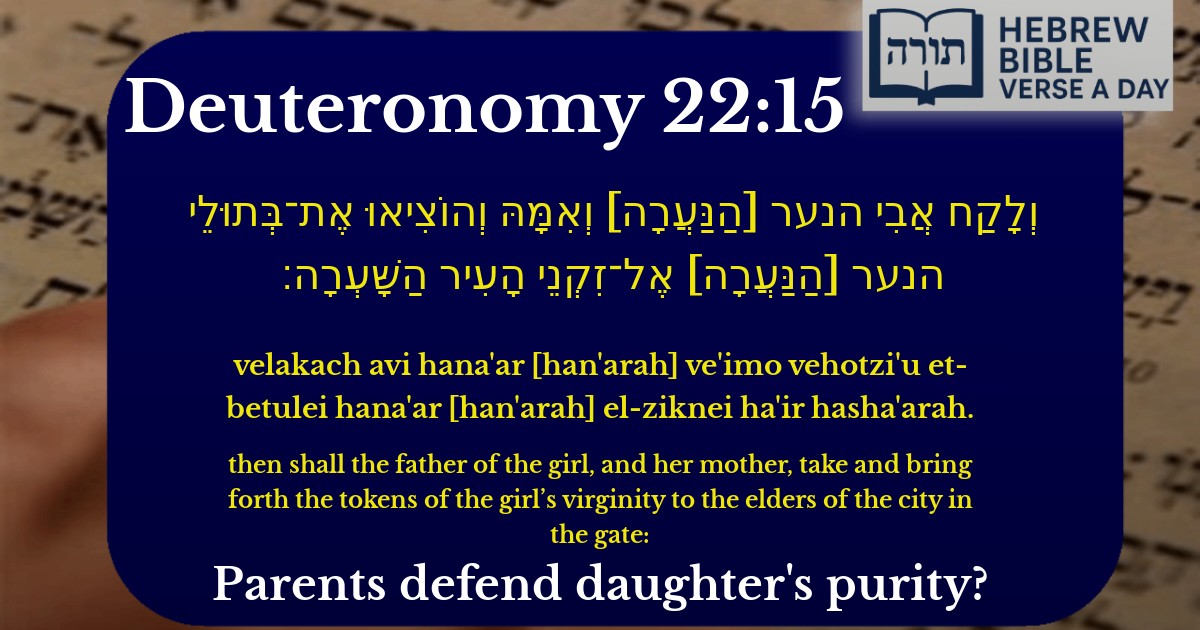Join Our Newsletter To Be Informed When New Videos Are Posted
Join the thousands of fellow Studends who rely on our videos to learn how to read the bible in Hebrew for free!
Hebrew Text
וְלָקַח אֲבִי הנער [הַנַּעֲרָה] וְאִמָּהּ וְהוֹצִיאוּ אֶת־בְּתוּלֵי הנער [הַנַּעֲרָה] אֶל־זִקְנֵי הָעִיר הַשָּׁעְרָה׃
English Translation
then shall the father of the girl, and her mother, take and bring forth the tokens of the girl’s virginity to the elders of the city in the gate:
Transliteration
Velakach avi hana'ar [han'arah] ve'imo vehotzi'u et-betulei hana'ar [han'arah] el-ziknei ha'ir hasha'arah.
Hebrew Leining Text
וְלָקַ֛ח אֲבִ֥י הַֽנַּעֲרָ֖ וְאִמָּ֑הּ וְהוֹצִ֜יאוּ אֶת־בְּתוּלֵ֧י הַֽנַּעֲרָ֛ אֶל־זִקְנֵ֥י הָעִ֖יר הַשָּֽׁעְרָה׃
Parasha Commentary
📚 Talmud Citations
This verse is quoted in the Talmud.
📖 Ketubot 46a
The verse is referenced in the discussion about the laws concerning a bride's virginity and the evidence required to support claims about her status.
📖 Sanhedrin 8a
The verse is cited in the context of legal procedures and the role of elders in adjudicating cases involving a bride's virginity.


Context in Torah
The verse (Devarim 22:15) appears in the context of the laws concerning a slanderous husband who falsely accuses his newlywed wife of not being a virgin. The parents are instructed to bring evidence of their daughter's virginity before the elders at the city gate, the traditional place of judgment.
Rashi's Explanation
Rashi explains that the phrase "the tokens of the girl's virginity" refers to the simanim (physical signs) of her virginity, specifically the blood-stained garment from the wedding night. He notes that both parents participate in this process to demonstrate their joint testimony about their daughter's purity.
Ibn Ezra's Insight
Ibn Ezra emphasizes that the parents bring the evidence "to the elders at the gate" because this was where legal matters were adjudicated in ancient Israel. The public nature of this proceeding serves both as a deterrent against false accusations and as a means to publicly clear the young woman's name.
Halachic Implications
Moral Lessons
The Midrash (Sifrei Devarim 237) derives from this verse the importance of protecting a person's reputation and the severity of making false accusations. The requirement for both parents to participate teaches that matters of family honor concern both father and mother equally.
Symbolic Interpretation
The Kli Yakar suggests that bringing the evidence "to the gate" symbolizes bringing truth into the open, as the city gate represents the interface between private and public life. This teaches that serious marital disputes should not be kept private when they involve questions of truth and justice.